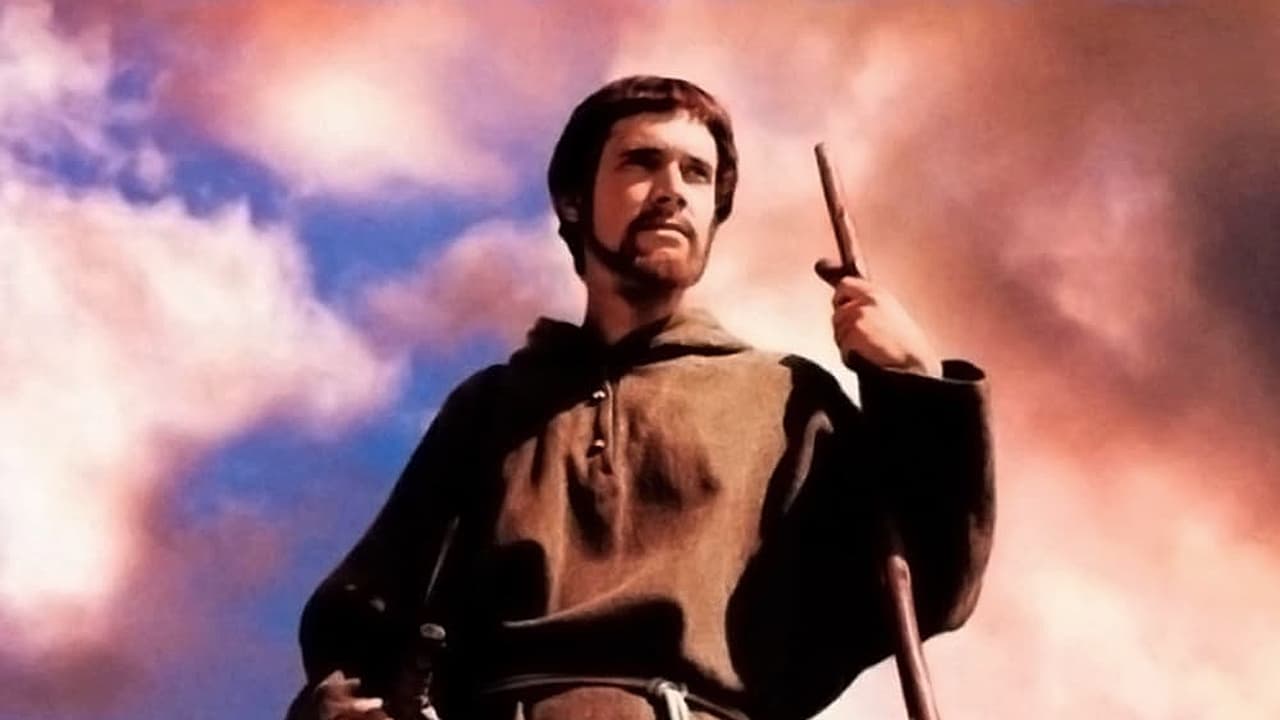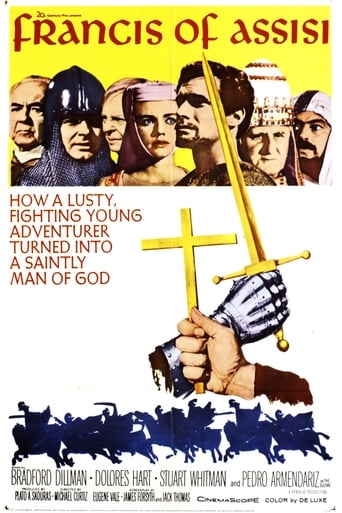

For each Romano-Catholic believer, the portrait of Francis of Assisi has precise traits, impecable nuances, the right frame. a film about him change nothing. for a Greek - Orthodox like me, it is more simple. legends adapted by different directors for a great effect. in this case, maybe, two pillars define the film - too Catholic sensitivity and too much Hollywood. each of them are far to be real errors or sins. it is a film by Michael Curtiz, represents part of an age of American cinematography, the time of impressive shows but , maybe, after the experience of other films about the Poor from Assisi, the film seems for me just a correct homework. sure, Iam really subjective.
... View MoreThis recreates a lot of the legends about Francis of Assisi - one of the best known of the Roman Catholic saints, who is also admired and much quoted by Protestants. There's no doubt that the movie also recreates some of the historical facts about his life - his disagreement with his father over the course his life should take, his visit to the Holy Land and encounter with the sultan and his struggle to gain recognition of his new order from the Pope. This also takes both the legends and the reality to unnecessary extremes at times - such as Francis' encounter with the cheetahs in the Sahara as he was seeking out the sultan. Throughout the whole movie, Francis is portrayed in a too pious light; his humanity (I mean by this his flesh and blood reality, as opposed to his kindness) seemed lost in the mix. This is not especially surprising when you consider that the movie is based on a hagiography (a biography of a saint) written by by the Catholic author Ludwig von Wohl, whose own commission from Pope Pius XII was to "write about the history and mission of the Church in the world." Clearly the Catholic Church wants its saints portrayed in the best light possible, and so a certain sense of veneration for Francis in a movie based on von Wohl's work is inevitable.Setting that aside (and even Protestants admire Francis, so I have no major criticism) what I most enjoyed here was the continual reflection in the movie on the state of the church and the Christian faith and Christians; the constant temptation (to which we all give in) to compromise the standards of Christ in favour of the standards of the world. The movie continually comes back to that theme; one could even say it revolves around it, as the primary battle Francis fights is to keep his order true to his "rule" - which was essentially the teachings of Christ that His own followers should renounce worldly possessions. Considering the repeated inability of Christians and the church to truly live up to the standards of Christ, the most meaningful words here were probably put on Francis' lips (although I'm unclear whether he actually spoke them): "if men were more perfect, we would need less compassion." So true.This is at times interesting - but it's still significantly weakened in my view by its veneration of Francis rather than its objective portrayal of his life.
... View MoreI had seen bits and pieces of this one some 22 years ago on Italian TV, while I was convalescing from an operation! Again, this is a highly popular filmic subject: there are at least 6 versions, half of which I've watched, including Roberto Rossellini's sublime THE FLOWERS OF ST. FRANCIS (1950).Bradford Dillman gives a sensitive portrayal of the beloved saint, and the supporting cast is equally well chosen: Dolores Hart and Stuart Whitman complete a fictional romantic triangle; Finlay Currie and Cecil Kellaway play high church officials; Pedro Armendariz is a sympathetic Arab ruler; while Mervyn Johns appears as Francis' most loyal disciple.The initial display of pageantry - with which director Curtiz is clearly more at home, being an expert in the field - is a welcome counterpoint to the mostly turgid solemnity of the film's second half. Generally workmanlike rather than inspired, it does have the occasional moving passage (I also happen to share the character's affection for animals); besides, the film is buoyed by a fine Mario Nascimbene score and the advantage of location shooting.No worse or better than many contemporaneous religious epics, the film is still worthier of consideration than Leslie Halliwell's two-word dismissal ("tedious biopic") would suggest...
... View MoreContrary to scant reviews of this movie as rather mediocre, several interesting aspects make it worth a viewing. Perhaps aside, there is the amazing parallel of movie-to-reality of lovely Dolores Hart, who plays the noble woman Clare. Clare forsook marriage to an earnest noble (Stuart Whitman) and followed Francis (Bradford Dillman), founding the Poor Clares order of nuns. Hart was on the verge of marriage in 1963, when she decided to become a nun. The acting is good enough to keep one interested. And seeing some of the last appearances of old guard like Finlay Currie, Cecil Kellaway, and irascible director Michael Curtiz (who directed many of Errol Flynn's swashbuckler movies and other Warner Bros. fare in Hollywood hey days) sufficiently tempts the serious movie buff. The movie itself has the looklots of color but also the lingering epic Hollywood scale--of historical yarns of the late 40s on through the 50s. Like the better efforts of this genre, the life of Francis progresses with a competent scriptparticularly in Francis's struggles against the establishment church. Thus it is historically preferable to Zeffirelli's minimalist Brother Sun, Sister Moon which frames Francis and Clare as more akin to 60s hippies than inhabitants of the 13th centurywith a plot that meanders like a music videoand Donovan's music to prove it (Zeffirelli also wanted the Beatles to appear in the movie!). This reviewer is perhaps tainted with some nostalgic bias, since as a small boy I saw the Southern California premiere of Francis of Assisi (in Downeysoutheast LA county suburb--of all places!) that included a live appearance and short commentary on stage by Stuart Whitman, who in his rough out style played Francis's friend-turned-antagonist (having been jilted by Clare) Count Paolo of Vandria. Years later at Universal I worked with Whitman, who, crusty as ever, recalled memories of the movie shoot as a tolerably pleasant experience.
... View More